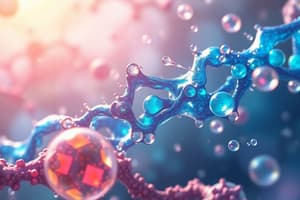Podcast
Questions and Answers
What does the term 'substrate' refer to in the context of enzymes?
What does the term 'substrate' refer to in the context of enzymes?
- The energy required for a reaction
- The molecule that an enzyme acts upon (correct)
- The active site of an enzyme
- The products formed by the enzyme
How does the lock and key model explain the specificity of enzymes?
How does the lock and key model explain the specificity of enzymes?
- Enzymes can be reused regardless of the substrate
- Each enzyme is designed to fit only one substrate (correct)
- Enzymes can act on multiple substrates
- Substrates can change shape to fit any enzyme
What is the primary role of enzymes in cellular reactions?
What is the primary role of enzymes in cellular reactions?
- To speed up reactions without being altered (correct)
- To provide energy for the reactions
- To increase the temperature of the reactions
- To be consumed in the reaction
Why are enzymes necessary for biological reactions within organisms?
Why are enzymes necessary for biological reactions within organisms?
What happens to an enzyme after it catalyzes a reaction?
What happens to an enzyme after it catalyzes a reaction?
How do enzymes lower the energy required for reactions?
How do enzymes lower the energy required for reactions?
Which statement best describes the variety of enzymes in a cell?
Which statement best describes the variety of enzymes in a cell?
What role do genes play in the function of enzymes?
What role do genes play in the function of enzymes?
Study Notes
Enzymes and Their Functions
- Enzymes are proteins that act as biological catalysts, accelerating chemical reactions without being consumed.
- Hundreds of different enzymes exist within a cell, each responsible for catalyzing unique reactions, reflecting cellular control.
- The sequence for enzyme action originates from genes:
- Genes → Proteins (enzymes) → Catalyze reactions in the cytoplasm.
Importance of Enzymes
- Enzymes are essential for cellular reactions due to the low temperatures within organisms (e.g., human body temperature is approximately 37°C).
- Without enzymes, most cellular reactions would occur too slowly to sustain life.
Enzyme Structure and Function
- Enzymes possess a specific area called the active site where substrates bind.
- The specific molecule an enzyme acts upon is termed the substrate.
- The attachment of the substrate to the active site reduces the energy needed for the reaction to initiate, thus facilitating product formation.
Enzyme Specificity
- Enzymes exhibit specificity; each enzyme catalyzes only one particular reaction based on the shape of the active site.
- This specificity is illustrated by the lock and key model, where the substrate (key) precisely fits into the enzyme's active site (lock).
Reaction Process
- Enzymes can catalyze both breakdown and synthesis reactions.
- In synthesis reactions, multiple substrate molecules can bind to the active site, leading to the formation of larger product molecules.
Product Release
- Once the reaction is completed and products are formed, they detach from the active site.
- The enzyme is then free to catalyze additional reactions, emphasizing its role in ongoing cellular processes.
Studying That Suits You
Use AI to generate personalized quizzes and flashcards to suit your learning preferences.
Description
This quiz explores the role of enzymes as biological catalysts in cellular reactions. Understand how these proteins facilitate and regulate various chemical processes within the cell. Test your knowledge on enzyme functions and their significance in cell activity.




